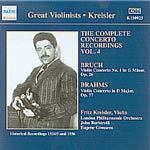
Great Violinists - Kreisler : Vol. 4 Bruch, Brahms (Rec 1924/25)
 $25.00
Out of Stock
$25.00
Out of Stock6+ weeks add to cart
MAX BRUCH / JOHANNES BRAHMS
Great Violinists - Kreisler : Vol. 4 Bruch, Brahms (Rec 1924/25)
Fritz Kreisler (violin) / London Philharmonic, Goossens, Barbirolli
[ Naxos Historical Great Violinists / CD ]
Release Date: Wednesday 5 June 2002
This item is currently out of stock. It may take 6 or more weeks to obtain from when you place your order as this is a specialist product.
Classic historic recordings remastered
"Naxos continues its reissue series devoted to Fritz Kreisler's complete concerto recordings with two priceless items. The Bruch G minor was recorded by the acoustic process in late 1924/early 1925. Although Kreisler approved the test pressings, for commercial reasons the recording never was issued. Electrical recording was on the horizon and would figuratively wipe acoustic orchestral 78s off the map. Fortunately, Kreisler's test pressings survived and now preserve our only chance to hear the violinist in a major work he otherwise didn't record. It's easy to listen past the threadbare, sardine-can accompaniment and zero in on Kreisler's rapt, committed performance. The antediluvian sonics do nothing to obscure his rich, baritonal timbre, old-fashioned yet purposeful portamentos, and vocally oriented phrasing. Mark Obert-Thorn's transfer is the cleanest and clearest of this performance I've heard. Rehearing Kreisler's 1936 Brahms concerto with John Barbirolli reinforces my opinion that it surpasses the fiddler's 1927 effort. For starters, it's better recorded, and Barbirolli gets more precise, sophisticated playing from the London Philharmonic than Leo Blech does from the Berlin State Opera Orchestra¡KObert-Thorn's transfer has admirable bloom and presence, with less of the darker, mid-range emphasis that characterizes Ward Marston's equally truthful transfer for Biddulph. An essential acquisition for Kreisler fans that's seductively priced and graced by succinct, scholarly, and informative notes by Tully Potter."
- www.classicstoday.com (Jed Distler) August 12, 2001
Friedrich 'Fritz' Kreisler was born in Vienna on 2 February 1875, the son of Sigmund Freud's family physician. His Polish father Salomon, an enthusiastic amateur, was Fritz's first leader then went on to Jacques Auber, leader of the Ringtheater orchestra. In 1882 he became the youngest student admitted to the Vienna Conservatory (studying violin with the younger Josef Hellmesberger, theory with Anton Bruckner) and made his début at Carlsbad (now Karlovy Vary) with the singer Carlotta Patti, sister of Adelina.
At ten he won the gold medal at the Conservatory, was given a three-quarter-size Amati by friends and transferred to the Paris Conservatoire (violin with Joseph Massart, composition with Léo Delibes). He met César Franck, played in the Pasdeloup Orchestra and in 1887 took a first prize in violin.
In 1888/9 Kreisler toured America with the pianist Moriz Rosenthal. He spent two years in Vienna, broadening his education; thought of following his father's profession and did two years of medical training; then did his military service. In 1896 he decided on music and, after the Court Opera Orchestra disappointment, began his career as a travelling virtuoso. He toured Russia, met Glazunov, found a wealthy sponsor and gradually advanced himself, getting to know Brahms, Joachim, Wolf and Schoenberg. In January 1898 he made his concerto début in Vienna with Bruch's G minor Concerto, conducted by Hans Richter, and a year later he had an even greater success when he played Bruch's D minor, Vieuxtemps's F sharp minor and Paganini's 'Non più? mesta' Variations for his début with the Berlin Philharmonic under Josef Rebicek. In November 1899 he was back in Berlin to play the Mendelssohn E minor Concerto under Arthur Nikisch. In 1900 he toured America and in 1902 he first appeared in London, with Richter conducting.
Kreisler's marriage to Harriet Lies in 1900 was crucial to his career, as she organized and motivated him from then on.
In 1904 he was awarded the Royal Philharmonic Society's Gold Medal, in 1911 he premiered the Elgar Concerto and by World War I, in which he was conscripted, wounded in the leg and reported killed, he was famous. He moved to the United States, giving generously to help war orphans and refugees and playing charity concerts. When America entered the war, he was sidelined as an enemy alien; the enforced rest resulted in his operetta Apple Blossoms and his String Quartet. From 1924 Kreisler made his home in Berlin but with the rise of Hitler in 1933, he refused to play in Germany any more.
His admission in 1935 that many 'baroque' pieces in his repertoire were his own compositions caused a public rumpus, as the English critic Ernest Newman took umbrage. After the Anschluss of Austria in 1938, Kreisler took French citizenship, then moved to the U.S. In 1941 he was hit by a van while crossing a New York street and was in a coma for four weeks. The accident ended his big-time career, though he remained a much-loved figure in America (taking citizenship in 1943) and did not stop playing until after the 1949/50 season. He died in New York on 29th January 1962.
- Tully Potter
Tracks:
MAX BRUCH
Violin Concerto No.1 in G minor Op.26
01. Introduction: Allegro moderato 07:22
02. Adagio 07:31
03. Finale: Allegro energico 06:33
Eugene Goossens, conductor
Recorded: 29 and 30 December, 1924 and 2 January 1925
JOHANNES BRAHMS
Violin Concerto in D major Op.77
04. Allegro non troppo 20:59
05. Adagio 08:29
06. Allegro giocoso, ma non troppo vivace 08:03
John Barbirolli, conductor / Eugene Goossens, conductor
Recorded: 29 and 30 December, 1924 and 2 January 1925